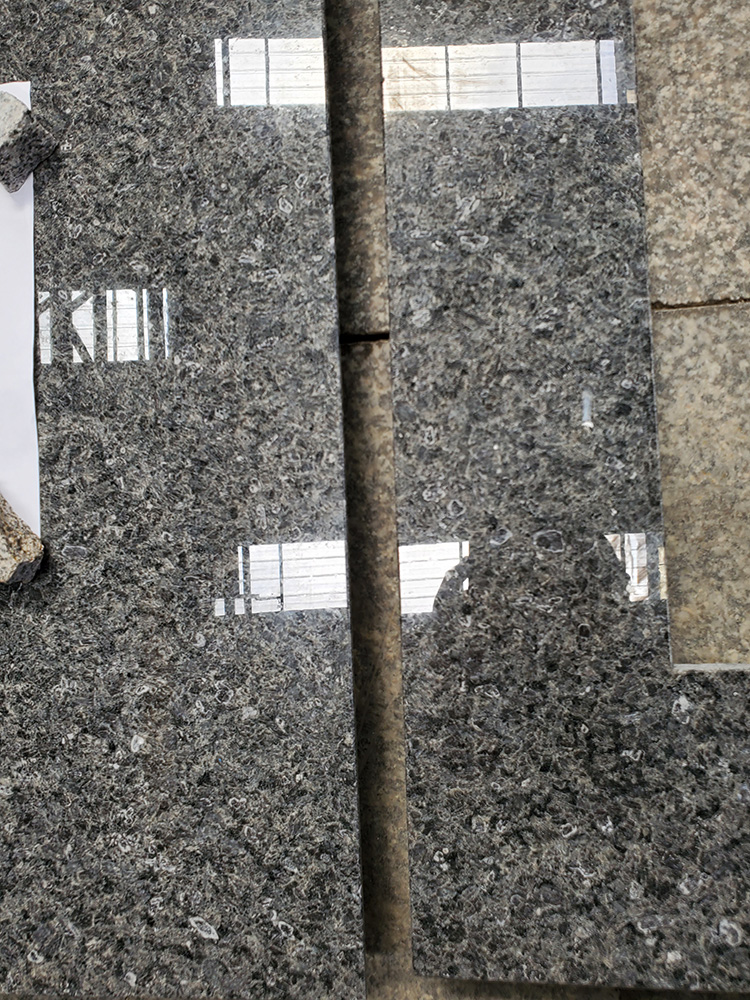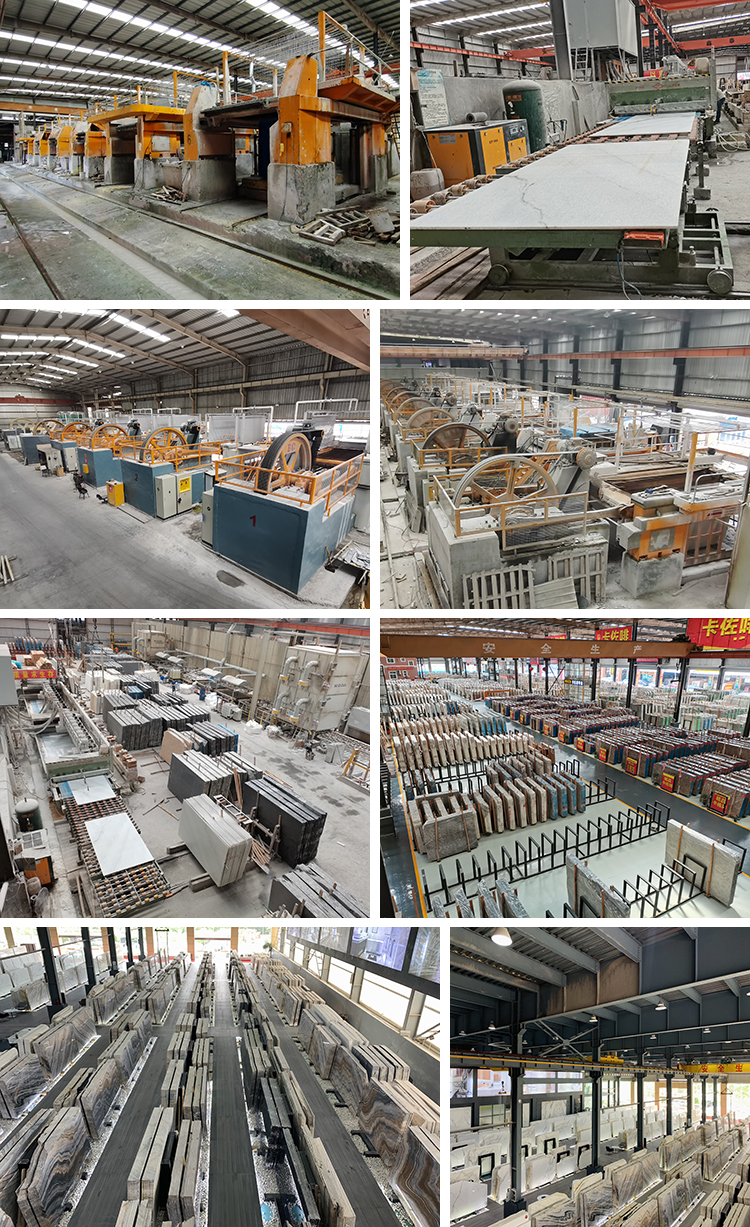From the limestone quarries of Carrara, right into the factory and out in an immersive showroom in Milan, designboom reveals Salvatori’s internationally renowned marble manufacturing journey. Floors, walls, bathrooms, living rooms and mirrors get revamped with the company’s original textures, colors, and grains, refined to top-tier quality carried from when the stone is collected to when it’s produced.
designboom visits Salvatori’s marble quarries in Carrara and brings the company’s production line to the surface Black Granite Slabs

all images courtesy of Salvatori unless stated otherwise
As we set foot in this marble haven in Carrara, Italy, we couldn’t help but admire the surrounding landscape, where the world-famous Bianco Carrara stone originates. Born in this region in 1946, specifically in the small town of Querceta near the Northern Tuscan coast, Salvatori started as a timber family business. Spanning three generations, the company has elevated it into a global design powerhouse renowned for its unique approach to working with natural stone under the leadership of CEO Gabriele Salvatori and his brother Guido. Celebrated for its innovative approach, craftsmanship, and elegant designs, the Italian brand’s product range extends from textures for walls and floors to washbasins, bathtubs, and various furnishings, including tables, lighting, and mirrors. Its success lies in its profound respect for the enduring nature of stone, crafting products meant to be passed down through generations.
Salvatori began its legacy in 1946, as a small timber family business | image © Lea Anouchinsky and Alberto Carlo Macchi
Salvatori's marble quarry |image © Lea Anouchinsky and Alberto Carlo Macchi
The quarry where Salvatori’s Bianco Carrara comes from has been named the biggest in the world for its amount of pure calcium carbonate (limestone) source of natural stone, with its caves spanning along the sides of the Apuan Alps. The unique territory of changing and fascinating landscapes has aided the company through the years in transforming its business and its products into examples of sophisticated luxury. According to Salvatori, the starting point for every product is that it should use as little stone as possible, in line with a maxim of quality not quantity.
witnessing the marble haven in Carrara, Italy | image © Lea Anouchinsky and Alberto Carlo Macchi
From the all-white quarries and into the factory, our visit uncovered Salvatori’s strong commitment to sustainability. The walk through the different equipment spoke volumes of all the refined research and attention to detail and quality that revolves the brand. From the CNC to the polishing machines, nothing during the process goes to waste; every single piece, in powder or solid form, finds its place. The selection of the different surfaces, and the continuity in detail that one has from the other, is done by eye. According to Salvatori, there is no machine capable of carrying a selection based on the similarities of the stone samples collected from the quarry, so it is in their workers hands, and eyes. It is this artisanship procedure which gives the products an even higher value. Given that each piece of natural stone is unique, the importance of human touch becomes apparent.
from the all-white quarries and into the factory, our visit uncovered Salvatori’s strong commitment to sustainability | image © Lea Anouchinsky and Alberto Carlo Macchi
Salvatori takes pride in its production line, merging traditional artisanship methods to contemporary manufacturing | image © Lea Anouchinsky and Alberto Carlo Macchi
An awareness of the responsibility that comes with working with a rare and precious natural material has been the driving force behind the company’s development not only of internal processes that reduce waste to a bare minimum, but also of a host of products and innovations designed to promote sustainability. This dedication, that became apparent during out guided tour, has led to Lithoverde®: the first ever recycled stone product manufactured on an industrial level. Made entirely from recovered natural stone and natural resin, with 99% of its content coming from offcuts and the final 1% a soy-based resin used as a binding agent, the 2010 project has been recognised by the US Green Building Council as contributing to the green credentials of a building.
‘To recycle the rectangular-shaped stones that, for many reasons, lose their utility during manufacturing, our workers pick each one by hand and stack them up to form a very big block, very similar to a Tetris layout. This is then wrapped all around by a plastic-like membrane that keeps them intact until a soy-based resin is shot out from either side to fill up all the gaps. Once dried, two days later, the result is a unified material that gets sliced into many different surfaces, and out comes Lithoverde,’ explains CEO Gabriele Salvatori to designboom.
seeing Lithoverde® from up close – the world’s first recycled stone produced industrially
The tour ended in the showroom, in Milan’s design-infused Brera area, on Via Solferino. Here, CEO Gabriele Salvatori himself talked us through the legacy of the brand, its rich history and even richer present and future. While natural stone remains a primary focus, the company has expanded its portfolio to include sustainable materials like wood and brass, offering comprehensive solutions for various spaces that span from interior design to outdoor areas, and from accessory designs to complete bathrooms. The desire to always think efficiently has also led the brand to develop tools and techniques designed to minimize any risk of installation problems, including a Plug&Play system that reduces time and costs through fast and stress-free installation.
the impressive panorama of the marble quarries | image © designboom
the tour ended in the showroom, in Milan’s design-infused Brera area, on Via Solferino
In terms of aesthetics, Salvatori also breaks the mould with its natural stone textures, such as the internationally-acclaimed Bamboo, widely considered the benchmark. It was also one of the first companies in the sector to involve established names from the architecture and design worlds in creating products, including Michael Anastassiades, Stephen Burks, Rodolfo Dordoni, Kengo Kuma, Piero Lissoni, Elisa Ossino, John Pawson, Yabu Pushelberg, Patricia Urquiola and Vincent Van Duysen. Today, the firm has a presence in over 35 countries, including company-owned showrooms in London and New York, and flagship stores in strategic cities including Amsterdam, Beijing, Shanghai, Tel Aviv and Tokyo.
it was also one of the first companies in the sector to involve established names from the architecture and design worlds
Taula Dining table by Patricia Urquiola
Flirt Chairs and Flirt Table with built-in chess board by Luca Nichetto
the company’s success lies in its profound respect for the enduring nature of stone
Salvatori’s philosophy is to create products that are meant to be passed down through generations
Pietra L05 Coffee Table by Piero Lissoni
mirrors, washbasins, bathtubs, and various furnishings all get revamped with Salvatori’s unique approach to natural stone

Marble Tile Bathroom a diverse digital database that acts as a valuable guide in gaining insight and information about a product directly from the manufacturer, and serves as a rich reference point in developing a project or scheme.